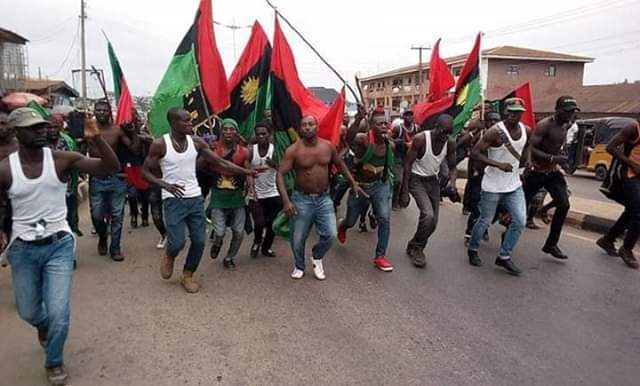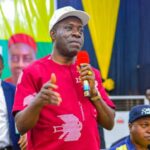The attack on the convoy of Senator Ifeanyi Ubah of the Young Progressives Party (YPP) last week, in which two policemen and three civilian aides of the lawmaker were killed, is only the latest episode in the steadily escalating blood-letting in South Eastern Nigeria – a region that once held the promise of Nigeria’s industrial hub.
Most of this violence is, of course, perpetrated by the proscribed terrorist organization, the Indigenous People of Biafra (IPOB) and its militant wing, the Eastern Security Network (ESN). But as it were, you can only whisper it; you cannot say it aloud.
7 Controversies That Ousted Erstwhile PSC Chairman, Musiliu Smith
Why Ebubeagu is linked to extrajudicial killings in South-East – Study
In a damning release by the Attorney-General of the Federation and Minister of Justice, Abubakar Malami, in October last year, IPOB, the AGF said, had killed 175 security operatives comprising 128 policemen, 37 military personnel and 10 others between October 2020 and June 2021 alone. In the same period, the AGF said IPOB/ESN had attacked 164 police stations and destroyed 628 police vehicles. IPOB/ESN also attacked and destroyed 19 offices and 18 vehicles of the Independent National Electoral Commission (INEC), and three correctional centres; freeing thousands of inmates during the same period. That report should have awakened critical voices in the Southeast and the rest of the country to both introspection and action about the state of insecurity in the region. Instead, it stirred no more than a whimper in the media and the public space.
And the orgy of violence in the Southeast has continued unabated. In fact, according to a report released last month by the Armed Conflict Location & Event Data Project (ACLED), a global security watchdog in the United States, violent attacks in South Eastern Nigeria have increased by over 80 per cent in the last year. In just the past six weeks, 11 policemen, three soldiers, 15 civilians and nine IPOB members have been reportedly killed in various attacks across the Southeast, including the five reportedly killed during the attack on Senator Ubah’s convoy by “unknown gunmen” last week.
We condemn the attack on Senator Ubah and his aides, whoever did it. But we are also constrained to call a spade a spade: IPOB and its militia, the ESN, are at the centre of rising violence in the Southeast. More than these, we also wish to place on record that the actions of critical sections of the Nigerian state and society, in the Southeast and the country at large, are deliberately or inadvertently enabling and emboldening IPOB’s increasingly violent turn in the past few years.
The governors of the five Southeastern states and the traditional and community leaders in the region have, collectively and individually, been reluctant to speak out clearly and forcefully against IPOB and ESN whenever they go on any of their rampaging terror against civilians or operatives of the Nigerian security agencies. Worse still, some of these leaders often go out of their way to deflect IPOB from blame or indeed attempt to justify IPOB’s reign of terror as the result of “marginalization” of the Southeast by the Nigerian state.
We note, very worryingly for example, that while condemning the attack on Senator Ubah’s convoy and describing it as “worrisome”, the spokesman for Ohanaeze Ndigbo Worldwide, Alex Ogbonnia, told The Nation newspaper just a day after the attack, that: “We make bold to say that the level of violence in the Southeast is caused by two key issues: criminality and aggression resulting from alienation and marginalisation. What is happening now is an effect of misgovernance”. This kind of conflicted illogic coming from elders of the region can only embolden the misguided youths in IPOB and ESN to believe that their use of violence in pursuing their agitations for a sovereign state of Biafra is justified.
We recall that President Muhammadu Buhari, no less, was compelled to speak in this direction during what a presidential statement described “the slaying of six Nigerien citizens and the brutal killing of some policemen at their duty posts” only last month. In that statement released by presidential spokesman Mallam Garba Shehu, Buhari had urged “community and religious leaders” in the Southeast “to speak more forcefully against the killings and to stand up and defend the ethos of the nation’s cultural and religious heritage”. But rather than pay heed to these words for once, leaders in the region came out forcefully against the government instead.
But the national media must also bear some responsibility for enabling IPOB’s murderous turn. Even though a federal high court had proscribed IPOB and described it as a terrorist organization since September 2017, the national media have been reluctant to describe IPOB in such terms. Moreover, even where security agencies officially confirm an attack to have been carried out by IPOB/ESN, our national media have preferred pointless labels like “unknown gunmen”, “assailants” and “hoodlums”.
All of these – the silent complicity of the community leaders and tacit deflection of responsibility for attacks by the media – have provided IPOB with a cultural capital to conveniently and repeatedly deny responsibility for any attacks, as well as cover to continue its attacks on civilians and the Nigerian state. More importantly, they have also complicated the political environment for security agencies to deal decisively with escalating terror in the Southeast. But the sole difference between a political movement and a terrorist organization is the use of violence against civilians or others to achieve their goals. By increasingly resorting to violence, IPOB is no longer just a separatist political movement but a terror group. Their enabling by critical voices in the polity must stop.

 Join Daily Trust WhatsApp Community For Quick Access To News and Happenings Around You.
Join Daily Trust WhatsApp Community For Quick Access To News and Happenings Around You.

